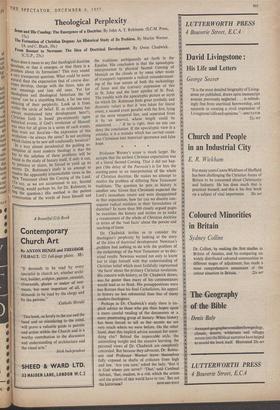Theological Perplexity
Jesus and His Coming: The Emergence of a Doctrine. By John A. T. Robinson. (S.C.M. Press, 150 The Formation of Christian Dogma: An Historical Study of Its Problem. By Martin Werner.
(A. and C. Black, 30s.) (C.U.P., 25s.)
WHAT does it mean to say that theological doctrine develops, or that it emerges, or that there is a Problem about its formation? This may sound a Very transparent question. What could be more natural than the expectation that of course doc- trines develop, change with the times, take on theologians meanings and lose old ones. Yet for eologians and theological historians the 'of course' can be a stumbling block, a far too easy silencing of their perplexity. Look at it from within the circle of belief. If, as orthodoxy has always maintained (any' development here?), historical faith is based pre-eminently upon historical events, if God's revelation of Himself was on for all given in a series of such events, ' then must not doctrine—the expression of this revelation—be 0u—be always the same? Is not anything which claims to be new self-confessedly heretical? In a way almost paradoxical the guiding as- sumption of most modern theology is that the found to the solution of these problems will be lound in the study of history itself, if only it can, by Patience or storm, be forced to yield up its secrets. Dr. Robinson's study is an attempt to New the apparently irreconcilable views in the (To Testament about the Coming of the Lord. Coming, say, as we are accustomed to say, Second L-c/rning, would perhaps be, for Dr. Robinson, to beg the question.) His method is the patient examination of the words of Jesus himself and the traditions ambiguously set forth in the Epistles. His conclusion is that the apocalyptic interpretation (a physical Second Coming of Messiah on the clouds or by some other mode of transport) represents a radical misunderstand- ing of the true nature of both the eschatology of Jesus and the (correct) expression of this in St. John and the later epistles of St. Paul. The trouble with the apocalyptic picture or myth (in which Dr. Robinson finds great symbolic and dramatic value) is that it 'was taken for literal event, a second event parallel with the first, lying in the same temporal line, and separated from it by an interval, whose' length could be
measured. . . If he is right, then no one can deny the conclusion. If the apocalyptic view is a mistake, it is a mistake which has carried count- less Christians into historical ignorance and false hope.
Professor Werner's scope is much larger. He accepts that the earliest Christian expectation was of a literal Second Coming. That it did not hap- pen (the delay of the Parousia') is for him the starting-point in an interpretation of the whole of Christian doctrine. He makes no attempt to resolve the problem of differing New Testament traditions. The question he puts to history is another one. Given that Christians expected the Lord's immediate return and were disappointed in that expectation, how far can we discern con- sequent radical. mistakes in their formulation of doctrine? In more than 300 closely argued pages he examines the history and invites us to make a reassessment of the whole of Christian doctrine in terms of the 'real facts' about the person and
teaching of Jesus. •
Dr. Chadwick invites us to consider the theologian's perplexity by looking at the story of the Idea of doctrinal development. Newman's problem had nothing to do with the problem of the eschatology of the New Testament or its doe-- trinal results. Newman wanted not only to know but to align himself with that understanding of Christian belief which most faithfully represented 'the facts' about the primary Christian revelation. His concern with history, as Dr. Chadwick shows, was far geater than many of his commentators would lead us to think. His presuppositions were less Roman than his final Catholicism, his appeal to history no less substantial than that of many modern theologians, - Perhaps in Dr. Chadwick's study there is im- plicit advice to those who pin their hopes upon a more careful reading of the documents or a more penetrating grasp of history. When history has been forced to tell us her secrets we are very much where we were before. On the other hand, does-this implicit advice account for some- thing else? Behind the impeccable style, the astonishing insight and the massive learning, the personal views of Dr. Chadwick are completely concealed. But because they advocate, Dr. Robin- son and Professor Werner leave ~themselves fully exposed to shafts of criticism from high and low. 'Are you sure,' asked the lady, 'that it is God whom you serve?' That,' said Cardinal Salviati, 'that, madam, is a risk which the artists and the priests of this world have to run.' But not














































 Previous page
Previous page